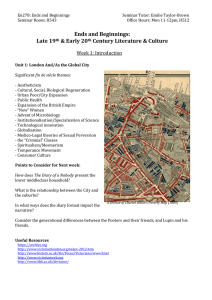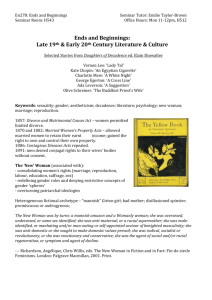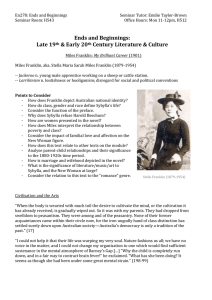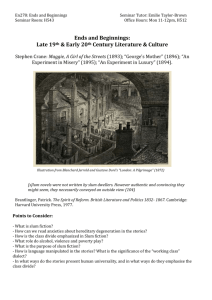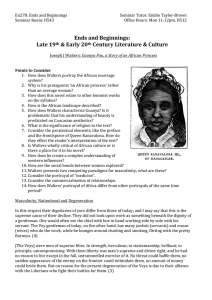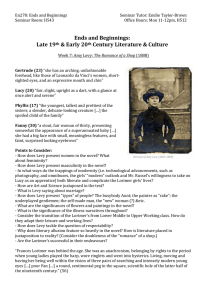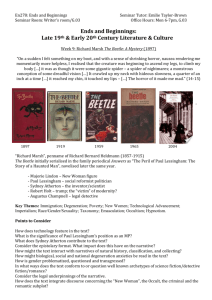En278: Ends and Beginnings Seminar Tutor: Emilie Taylor-Brown Seminar Room: H543
advertisement
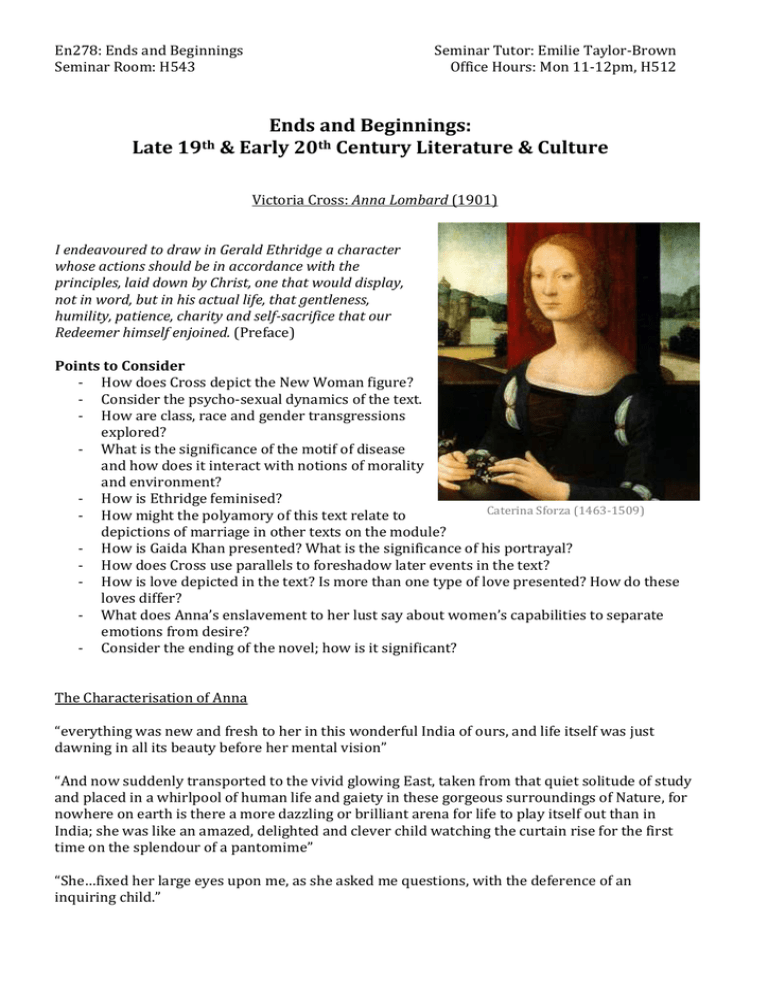
En278: Ends and Beginnings Seminar Room: H543 Seminar Tutor: Emilie Taylor-Brown Office Hours: Mon 11-12pm, H512 Ends and Beginnings: Late 19th & Early 20th Century Literature & Culture Victoria Cross: Anna Lombard (1901) I endeavoured to draw in Gerald Ethridge a character whose actions should be in accordance with the principles, laid down by Christ, one that would display, not in word, but in his actual life, that gentleness, humility, patience, charity and self-sacrifice that our Redeemer himself enjoined. (Preface) Points to Consider - How does Cross depict the New Woman figure? - Consider the psycho-sexual dynamics of the text. - How are class, race and gender transgressions explored? - What is the significance of the motif of disease and how does it interact with notions of morality and environment? - How is Ethridge feminised? Caterina Sforza (1463-1509) - How might the polyamory of this text relate to depictions of marriage in other texts on the module? - How is Gaida Khan presented? What is the significance of his portrayal? - How does Cross use parallels to foreshadow later events in the text? - How is love depicted in the text? Is more than one type of love presented? How do these loves differ? - What does Anna’s enslavement to her lust say about women’s capabilities to separate emotions from desire? - Consider the ending of the novel; how is it significant? The Characterisation of Anna “everything was new and fresh to her in this wonderful India of ours, and life itself was just dawning in all its beauty before her mental vision” “And now suddenly transported to the vivid glowing East, taken from that quiet solitude of study and placed in a whirlpool of human life and gaiety in these gorgeous surroundings of Nature, for nowhere on earth is there a more dazzling or brilliant arena for life to play itself out than in India; she was like an amazed, delighted and clever child watching the curtain rise for the first time on the splendour of a pantomime” “She…fixed her large eyes upon me, as she asked me questions, with the deference of an inquiring child.” En278: Ends and Beginnings Seminar Room: H543 Seminar Tutor: Emilie Taylor-Brown Office Hours: Mon 11-12pm, H512 “Her head was thrown back, her face fresh as a flower, was upturned; the cheeks were like petals of a wild rose, the mouth deep crimson like a pomegranate bud, and her hair, ruffled, loosened, fell in glistening waves…” Narratives of Cultural Authority “Then you’ll enjoy legitimate matrimony for five years, and when your time’s up you pay the bill, say good-by and there’s no trouble.” “She brought him five flowers of the morning, and he was to stretch forth his kingly hand and indicate which would best suit him for a wife […] some chalk or white paste had been rubbed over their faces to simulate the Ayran complexion, and a round, pink spot painted in the middle of each cheek. Their faces were Mongolian in type, more like the Chinese face than any other, but their mouths were soft and pretty. Their diminutiveness was the most striking thing about them. They seemed like little children.” “I returned, speaking of course, always in her vernacular.” “She lisped softly, “Ashik karti” or “ I love you”, to show me she too could speak Hindustani.” “She left here at the hour of ten, unharmed. I know nothing more of her than that. I give you the white man’s truth.” “Five years! So she knew the exact length of my appointment, probably the amount of my salary and private income to an anna. They know everything, these people.” “She knew, probably, more of the way in which heat and silence can work on the white man’s brain than I did.” Tropics and Isolation “Day after day passed and post after post came in, and not a line came to me from that dear outer world, where people were living, any more than news comes to the inmates of the grassy graves.” “…knowing there was no where to go, nothing to do, no one to see, no one to speak to. I was completely alone in this blank, tepid silence, shut in upon myself on every side by walls of falling rain.” “Oh, how I longed for a letter; how priceless one would have been to me then; it would have seemed like a hand sketched out to me from the real, living world that was somewhere far off, away in the distance. I seemed out of the world. Dead, buried and forgotten.” En278: Ends and Beginnings Seminar Room: H543 Seminar Tutor: Emilie Taylor-Brown Office Hours: Mon 11-12pm, H512 British India as Edenic “So might have Aurora herself, wearied with tending the flowers, been found sleeping in the Elysian fields.” “A large tank of water, reflecting the branches overhead till it looked like liquid emerald, stood bedded in moss close by, and the tiny trickle and gurgle of water flowing from it around the couch seemed to intensify the surrounding coolness. What a scene it was! One possible only, perhaps, in India, where the stream of Saxon civilisation, with all its richness, comfort and wealth, flows abruptly into the wonders of native Indian beauty, into that store of gorgeous colouring, of blossoms without name, of scents without definition, of skies and gardens past belief.” “Could Milton have anywhere seen a fairer vision for his Eden, Theocritus to have dreamed lovelier things for his idyls, or the ancients have imagined more for their Elysian fields? But such surroundings are every-day and commonplace in India, and the birth right of every Briton.” The Tropics as Pestilential “No other European was going to alight at this station” “Lihuli…the place of swamps…where there is always some epidemic raging; sometimes it is called the black cholera, sometimes the plague, sometimes small pox; where there is a nevervarying accompaniment of malarial fever and dysentery; where the air, night and day, is tainted and suffocating; where the evening, that brings coolness elsewhere, brings but a sickly white miasma-tainted mist from the swamps and clouds of mosquitoes; where the face of a white woman is never seen…where there is nothing but desert, disease, death and duty.” “Had I been ordered to a hill station, one with even a moderately good climate and where white life was not wholly excluded, I might have had the courage enough to ask her to occupy a large, cool rose-covered bungalow…as the wife of an assistant-commissioner instead of the daughter of a general; but I could not take a girl, straight from England, to share with me a fever- and cholera-haunted swamp, even if she would come.” “They waved their hands and set up a feeble cheer as they caught sight of me. They all had the same blanched pinched-looking faces, wan eyes and dry white lips.” “They all looked so sickly and listless, like men one sees hanging round the balconies of public hospitals or convalescent homes, that the idea of their doing anything so far requiring an effort as meeting their new deputy commissioner seemed rather a joke than anything else.” “Doubtless a message of the approaching death from the skies…” “…a portly, venomous looking scorpion, that was making its way to my bed.” “The heat was so intense that I sprung up, involuntarily fancying for the moment that someone was trying to smother me with pillow or blanket. But no. It was only the intolerable pressure of the thick, suffocating air.” En278: Ends and Beginnings Seminar Room: H543 Seminar Tutor: Emilie Taylor-Brown Office Hours: Mon 11-12pm, H512 “I would leave it till later and go now to see the notorious swamps, the blue, miasma-laden, death-dealing swaps of Lihuli. I would go now while I was fresh and strong, before the place had thinned and weakened my stock of clean blood.” “….desolate, tainted, deadly as they were, they yet possessed a peculiar beauty of their own that same wonderful beauty that rises before one’s eyes everywhere in the East and is the consolation for all its trials.” “…blood red in the evening light…streams of decaying vegetation and forming carbon…the pale, poisonous mist on every side. It was quite silent but for the sing-sing of the mosquitoes around us. “If you had spoken then, I would have followed you to Burmah, or Hades if you wished…” Tropicality and Morality “She sat sipping her ice cheerfully and diligently, for ice, like virtue, does not last long in the tropics” “Ethridge, you’ll come to a bad end. You’re intemperate and intemperance in India, no constitution can stand.” “I’m not intemperate.” “You are intemperately virtuous, and it won’t do […] you drive things to extremes, and one can’t stand extremes here. You are extremely moderate, and it wont pay. You should be moderately moderate. The moderate man is the only one who lives here. Moderately bad, moderately good, moderately drinks, and is moderately virtuous.” “You must be mad or I am. Englishmen do not share their wives.” “Draupadi is one of the dearest Hindu ideals […] She is the type of pure, trustful womanhood and faithful wifehood answering to the Greek conception and British acceptance of Penelope […] strange and to Englishmen perverted idea; yet thousands of cultivated and enlightened individuals through many ages have been able to comprehend it and associate it with an ideal of purity. And was I wholly justified in the revolt and loathing I had felt of Anna when she made her final suggestion to me this afternoon?” The Racial Other “Married to a native! One needs to have lived in India to fully comprehend the horror contained in those words. Aside from the moral degradations of life shared with one who, according to the British standpoint, has no moral sense, of being allied with a race whose vices and lives are beyond description; there is the daily, hourly physical danger from a native’s insensate jealousy, unreasoning rage, and childish, yet fiendish revenge.” “The skin was smooth and soft as velvet, of a tint of burnished copper, but glowing and transparent; and eyes full of intellect and pride […] what a marvel of humanity […] that beauty was like a sort of magic […] if I had been a woman, I might have been as faithless to Anna as she was now to me, for his sake.” En278: Ends and Beginnings Seminar Room: H543 Seminar Tutor: Emilie Taylor-Brown Office Hours: Mon 11-12pm, H512 “What has passed before me had been an idyl of purity and dignity and grace. No kiss could have been given or received with more perfect chastity of look, gesture and action […] the bending of his kingly head till his lips touched hers would have been an ideal for a painter drawing a monarch bestowing a kiss upon his betrothed. And he was a barbarian who trod the streets of a bazaar with naked dusty feet!” The New Woman A cluster of Anglo-Indian novels written between the 1890s and 1920s by female writers introduce Memsahibs (the wives or daughters of high-ranking civil servants and officers in colonial India) who contemplate the idea of turning courtesan and of subsequently escaping their domestic and imperial obligations, obligations that seem to thwart rather than foster their aspirations for female independence. As Thomas Metcalf aptly suggests, “the English woman, within the private sphere she presided over, bore the unenviable responsibility—what one may call the ‘white woman’s burden’3—of both representing the virtues of domesticity and extending the authority of the Raj.” --- Charm Jagpal, “Going Nautch Girl” in the Fin de Siecle: The White Woman Burdened by Colonial Domesticity” English Literature in Transition, 1880-1920 52.3 (2009):252-272.
